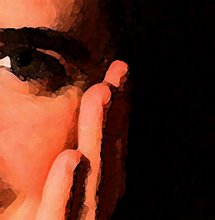Ernest Becker's The Denial of Death overflows with "I" words. This book has been around a long time but I only learned of it this past autumn, when two different people (a rabbi, a friend) recommended it for slightly different reasons. Becker is brilliant at synthesizing the work of Freud and other psychoanalysts, psychologists and thinkers on the difficult subjects of human character, neurosis and how we create meaning. I liberally used a highlighter while reading it and I will probably reread many passages again and again. I was particularly interested in what he had to say about creative types and artists. First:
"Most people play it safe: they choose the beyond of standard transference objects like parents, the boss or the leader; they accept the cultural definition of heroism and try to be a 'good provider' or a 'solid' citizen. In this way they earn their species immortality as part of a social group of some kind."
And then...
"...personal heroism through individuation is a very daring venture precisely because it separates the person out of comfortable 'beyonds'....The most terrifying burden of the creature is to be isolated, which is what happens in individuation: one separates himself out of the herd. This move exposes the person to the sense of being completely crushed and annihilated because he sticks out so much, has to carry so much in himself. These are the risks when the person begins to fashion consciously and critically his own framework of heroic self-reference.
"Here is precisely the definition of the artist type, or the creative type generally.....the key to the creative type is that is separated out of the common pool of shared meanings. There is something in his life experience that makes him take in the world as a problem; as a result, he has to make personal sense out of it. This holds true for all creative people to a greater or lesser extent, but it is especially obvious with the artist. Existence becomes a problem that needs an ideal answer; but when you no longer accept the collective solution to the problem of existence, then you must fashion your own. The work of art is, then, the ideal answer of the creative type to the problem of existence as he takes it in - not only the existence of the external world, but especially his own: who he is as a painfully separate person with nothing shared to lean on....he wants to know how to earn immortality as a result of his own unique gifts. His creative work is at the same time the expression of his heroism and the justification of it. It is his 'private religion' - as Rank put it......No sooner have we said this than we can see the immense problem that it poses. How can one justify his own heroism?"
Aha! I thought as I read this passage, which both relieved and terrified me. The relief came from recognizing parts of myself in these words, the sense I've had for a long time that I don't necessarily share in our society's idea of what is heroic and that I want to experience everything on my own terms. And the terror came from the sense of Oh shit, I'm too far down the path of being different to retrace my steps and try to find meaning where others do, but I'm not sure I have the nerve - or the talent - to keep bushwhacking forward.
More to follow.
Wednesday, January 2, 2008
Subscribe to:
Post Comments (Atom)




No comments:
Post a Comment